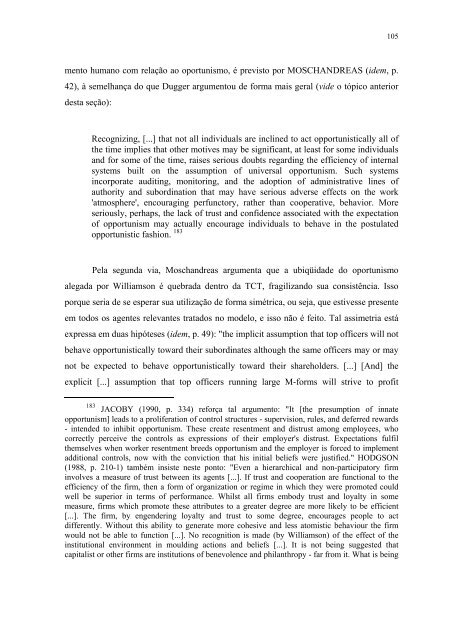Download - Núcleo de Pesquisa em Economia Empresarial ...
Download - Núcleo de Pesquisa em Economia Empresarial ...
Download - Núcleo de Pesquisa em Economia Empresarial ...
You also want an ePaper? Increase the reach of your titles
YUMPU automatically turns print PDFs into web optimized ePapers that Google loves.
mento humano com relação ao oportunismo, é previsto por MOSCHANDREAS (i<strong>de</strong>m, p.<br />
42), à s<strong>em</strong>elhança do que Dugger argumentou <strong>de</strong> forma mais geral (vi<strong>de</strong> o tópico anterior<br />
<strong>de</strong>sta seção):<br />
Recognizing, [...] that not all individuals are inclined to act opportunistically all of<br />
the time implies that other motives may be significant, at least for some individuals<br />
and for some of the time, raises serious doubts regarding the efficiency of internal<br />
syst<strong>em</strong>s built on the assumption of universal opportunism. Such syst<strong>em</strong>s<br />
incorporate auditing, monitoring, and the adoption of administrative lines of<br />
authority and subordination that may have serious adverse effects on the work<br />
'atmosphere', encouraging perfunctory, rather than cooperative, behavior. More<br />
seriously, perhaps, the lack of trust and confi<strong>de</strong>nce associated with the expectation<br />
of opportunism may actually encourage individuals to behave in the postulated<br />
opportunistic fashion. 183<br />
Pela segunda via, Moschandreas argumenta que a ubiqüida<strong>de</strong> do oportunismo<br />
alegada por Williamson é quebrada <strong>de</strong>ntro da TCT, fragilizando sua consistência. Isso<br />
porque seria <strong>de</strong> se esperar sua utilização <strong>de</strong> forma simétrica, ou seja, que estivesse presente<br />
<strong>em</strong> todos os agentes relevantes tratados no mo<strong>de</strong>lo, e isso não é feito. Tal assimetria está<br />
expressa <strong>em</strong> duas hipóteses (i<strong>de</strong>m, p. 49): "the implicit assumption that top officers will not<br />
behave opportunistically toward their subordinates although the same officers may or may<br />
not be expected to behave opportunistically toward their sharehol<strong>de</strong>rs. [...] [And] the<br />
explicit [...] assumption that top officers running large M-forms will strive to profit<br />
183 JACOBY (1990, p. 334) reforça tal argumento: "It [the presumption of innate<br />
opportunism] leads to a proliferation of control structures - supervision, rules, and <strong>de</strong>ferred rewards<br />
- inten<strong>de</strong>d to inhibit opportunism. These create resentment and distrust among <strong>em</strong>ployees, who<br />
correctly perceive the controls as expressions of their <strong>em</strong>ployer's distrust. Expectations fulfil<br />
th<strong>em</strong>selves when worker resentment breeds opportunism and the <strong>em</strong>ployer is forced to impl<strong>em</strong>ent<br />
additional controls, now with the conviction that his initial beliefs were justified." HODGSON<br />
(1988, p. 210-1) também insiste neste ponto: "Even a hierarchical and non-participatory firm<br />
involves a measure of trust between its agents [...]. If trust and cooperation are functional to the<br />
efficiency of the firm, then a form of organization or regime in which they were promoted could<br />
well be superior in terms of performance. Whilst all firms <strong>em</strong>body trust and loyalty in some<br />
measure, firms which promote these attributes to a greater <strong>de</strong>gree are more likely to be efficient<br />
[...]. The firm, by engen<strong>de</strong>ring loyalty and trust to some <strong>de</strong>gree, encourages people to act<br />
differently. Without this ability to generate more cohesive and less atomistic behaviour the firm<br />
would not be able to function [...]. No recognition is ma<strong>de</strong> (by Williamson) of the effect of the<br />
institutional environment in moulding actions and beliefs [...]. It is not being suggested that<br />
capitalist or other firms are institutions of benevolence and philanthropy - far from it. What is being<br />
105



